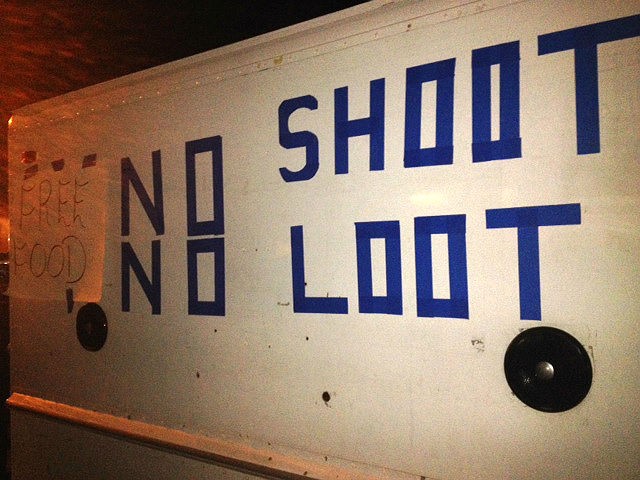
Ferguson, MO, where the killing of Michael Brown resulted not in the filing of a police report but in the firing of tear gas on a peaceful group of demonstrators, is now the center of the struggle for equality — along with St. Louis, the river metropolis that contains the smaller municipality.
In St. Louis, people are demonstrating with clear demands. Diverse groups are meeting, talking, and listening. One week after Michael Brown’s killing, an artists’ collective met on Cherokee Street at a place that is pretty much the Hi-Tone with more Star Wars decorations. Almost 250 musicians, writers, and poets gathered on an early Saturday afternoon to talk, brainstorm, and make a difference.
Some speakers advocated force. “The establishment only responds to violence, so it leaves us with little options.” Some advocated a rejection of the system. “Maybe we need a different currency, like bitcoin. Maybe we need our own police force.” Some advocated solutions within the system. Improved education and voter registration were the most popular topics. Every suggestion yielded a reaction, a counterpoint, and a discussion.
Violence won’t win any day. Bitcoin won’t work for a neighborhood with limited computer access. New police force or not, the current force must be held accountable. And with regard to registration and education, the group tempered their forcefulness.
“Whatever we do,” said Pacia Richardson, an educator who lived nearby, “we have to talk to the people, and we have to listen.”
That was the point that ruled the day. We have to talk, and we have to listen.
Later in the meeting a musician named YaYa unleashed emotions that appeared to have been churning his entire life.
“I can’t trust white people, and I love y’all!” he said, fury in his eyes. “I don’t get what you get. Most of you are cool, but you got people right around you who won’t talk to you because you like me. And you need to talk to those motherfuckers!”
The room responded to his outburst with head nods. With understanding. And that was happening elsewhere.
On the sidewalks of West Florissant Avenue, where all the cameras have been rolling and the gas canisters flying, people are working together.
Captain Ron Johnson of the Missouri State Highway Patrol, who took over policing West Florissant and nearby Canfield after the disastrous attempts by local police, walks up and down the street among a few other officers and some reporters.
He and his escorts, in standard blue uniforms with no extra armor or weapons, circle the block on foot, stopping to chat with demonstrators and business owners.
A local businessman has set up a food truck and is cooking free meals for anyone who wants one. The side of his truck says, “no shoot no loot.” A handful of people are giving cool water to demonstrators and police.
Inside Ferguson Burgers & More, Charles Davis takes orders and passes out smiles. He breaks from nonstop business to entertain a visit from Missouri State Attorney General Chris Koster. People are trying to talk and listen.
And this is how change is going to happen: open dialogue, safe places for expression, and willingness from everyone to really hear what the other has to say.
One week in, a lot of reactions in St. Louis are turning in this direction. But certainly not all of them, and certainly not everywhere. And that’s where we have a problem.
Last week I posted three stories about my day in Ferguson on the Flyer‘s website. I did everything I could to not insert opinion, to report what I saw in a way that could make the reader feel like they were there, and to frame those stories with themes I thought were accurate, the biggest one being trust.
No matter the theme or the details, the first comments were almost always racial stereotypes, ill-informed remarks, or blaming of the “other.” In a series of stories about people trying to come together after unspeakable tragedy and violence, the first thing many could think to say was some variation of “everything’s fine, nothing to see here; black people are the problem.”
If you’ve made it this far into this column, you know people like that. And to quote YaYa, you need to talk to those motherfuckers. Because talking and listening are the only ways we’re going to change.
Doug Gillon is a Memphis writer. He attended the University of Missouri and has ties to the St. Louis area.